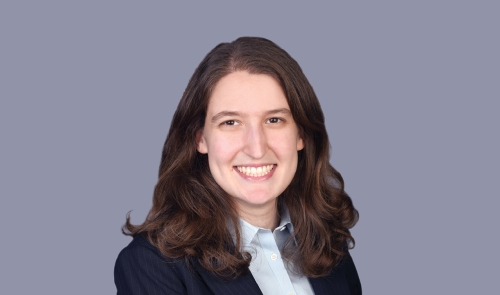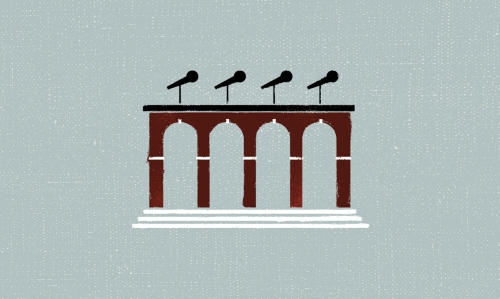Student Spotlight: Shira Silver ’27

Shira Silver ’27
Student Fellow, Peter L. Zimroth Center on the Administration of Criminal Law
How did you decide to pursue law?
I’ve always enjoyed problem-solving. As an undergrad, I paired a major in philosophy with a minor in computer science. Philosophers and computer scientists share the common project of using rigorous logical reasoning and precise language to solve complex problems. At their best, lawyers, too, are problem solvers, using the same tools I’ve just described to help real people solve real problems.
I confirmed my desire to practice law—and in particular, to litigate—while working as a legal analyst at Kobre & Kim. At K&K, I spent more than a year on a trial team defending a client against criminal charges of market manipulation and fraud in the US District Court for the Northern District of Illinois. I learned that I love the way arguments are developed and sharpened in preparation for trial. Specifically, I love the process of making and evaluating arguments about how specific laws should be applied to specific sets of facts and the way the sharpest arguments demonstrate a mastery of both the facts and the law.
You’re a student fellow at the Zimroth Center on the Administration of Criminal Law this year. Tell us about that experience and what you’re most looking forward to.
In my first semester of law school, I had the privilege of studying Criminal Law with Charles Seligson Professor of Law Rachel Barkow, who serves as faculty director of the Zimroth Center. A recurring theme of the course was the tremendous discretion afforded to the actors who administer criminal law—police officers, prosecutors, and judges—and the ways this discretion shapes outcomes for individuals accused of committing crimes. This theme is at the core of the Zimroth Center's mission of promoting good government practices in criminal matters, with a special focus on the exercise of prosecutorial power and discretion.
Last spring, I attended the center’s Kenneth P. Thompson ’92 Lecture on Race and Criminal Justice Reform, during which panelists discussed a number of approaches to addressing prosecutorial misconduct. I was energized by their creative problem-solving and, shortly thereafter, I applied to be a student fellow at the center. This semester, I will be assisting Professor Barkow with research related to her latest book, Justice Abandoned: How the Supreme Court Ignored the Constitution and Enabled Mass Incarceration. Specifically, I will be researching United States v. Salerno and the history of bail reform in the United States.
As an aspiring litigator, who anticipates spending time in both prosecutor’s offices and defense firms, I feel deeply invested in the project of holding all actors in the criminal law system accountable. I look forward to working closely and developing relationships with the Zimroth Center’s faculty and student fellows as we engage in this important work.
Which Law School class or experience has had the biggest impact on you?
One of the most formative classes from my first year at NYU Law was Civil Procedure with Bonnie and Richard Reiss Professor of Constitutional Law Samuel Issacharoff. A practicing litigator, in addition to a distinguished scholar, Professor Issacharoff encouraged us to read every rule and ruling with an eye toward whether it would make sense, not only in theory, but in practice—always remembering that judicial rulings affect real people. I learned to understand the Federal Rules of Civil Procedure as trying to balance efficiency with fairness and to evaluate judicial opinions on the basis of how well they strike that balance.
More generally, the warm and collegial culture at NYU Law—special shoutout to the Class of 2027, Section 3!—has had a huge positive impact on my experience. I am so impressed that a group of such hard-working, high-achieving students, who are being graded on a curve, could be so invested in each other’s successes and in treating each other well. As a concrete example, I’ve come to genuinely enjoy cold calls, and I believe this is largely a result of our supportive classroom environment. Knowing my classmates are rooting for me has taken off so much pressure and allowed me to focus on the opportunity to be positively challenged.
What do you most like to do outside of class? What’s your favorite way to spend a day in New York City?
I’ve always loved spending time in libraries and museums. This summer, I’ve been working my way through the New York Public Library’s events calendar. A special highlight was NYPL’s Silent Disco, hosted in Lincoln Square Plaza. The event was a great throwback, not only to the ’70s, but also to my final Lawyering brief, which turned on the question of whether a publicly owned, privately managed plaza should be considered a traditional public forum for purposes of First Amendment freedoms. I—and most of my classmates—cited a Second Circuit opinion addressing this question in the context of Lincoln Square Plaza. Let’s just say this event helped me see the case under new (disco) lights!
Have you read any books or heard any podcasts lately that you would recommend?
I’ll take this opportunity to plug Main Justice, hosted by Professor Andrew Weissmann and Mary McCord. I’ve been listening to the podcast since it was still called Prosecuting Donald Trump. Now that the criminal cases against Donald Trump have wound down, the podcast, renamed for the main Department of Justice building in Washington, DC, breaks down what’s happening inside the Trump administration’s DOJ. As a fan of the podcast, it was a special treat for me to participate in Professor Weissmann’s 1L reading group, Big Brother; Big Data: Surveillance in the Age of AI, over the course of this past year.
This interview has been condensed and edited.


